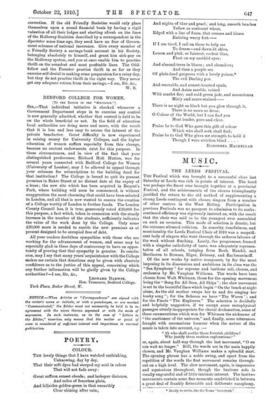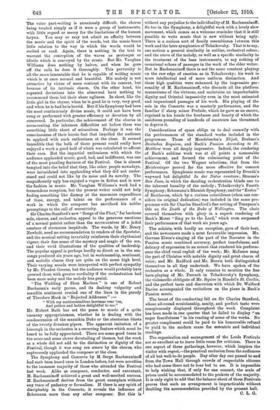MUSIC.
THE LEEDS FESTIVAL.
TILE Festival which was brought to a successful close last Saturday at Leeds was rich in points of interest. The band was perhaps the finest ever brought together at a provincial Festival, and the achievements of the chorus triumphantly justified the return to the old method of supplementing a strong Leeds contingent with chosen singers from a number of other centres in the West Riding, Participation in previous Festivals was no passport to admission to its ranks : continued efficiency was rigorously insisted on, with the result that the choir was said to be the youngest ever assembled on such an occasion. This mode of selection is drastic, but the outcome silenced criticism. In sonority, tunefulness, and musicianship the Leeds Festival Choir of 1910 was a magnifi- cent body of singers who went through the arduous labours of the week without flinching. Lastly, the programme, framed with a singular catholicity of taste, was adequately represen- tative of all schools, ranging from Bach, Handel, and Beethoven to Strauss, Eiger, Debussy, and Raclimaninoff.
Of the new works by native composers, by far the most
imposing in its dimensions and ambitious in its aims was the " Sea Symphony " for soprano and baritone soli, chorus, and orchestra by Mr. Vaughan Williams. The words have been chosen from Walt Whitman, those for the opening movement being the " Song for All Seas, All Ships" ; the slow movement is set to the beautiful lines which begin " On the beach at night alone, As the old mother sways her to and fro singing her husky song "-; for the Scherzo we have " The Waves " ; and for the Finale " The Explorers." The selection is decidedly and helpfully suggestive, if we except some metaphysical passages utterly inappropriate for choral declamation, some of those enumerations which won for Whitman the nickname of "the auctioneer of the universe," and, finally, some utterances fraught with unconscious humour when the nature of the music is taken into account, e.g. :— " Ah who shall soothe those feverish children?
Who justify these restless explorations ? "
or, again, about half-way through the last movement, " 0 we can wait no longer." Still, the words are in the main happily chosen, and Mr. Vaughan Williams makes a splendid start. The opening phrase has a noble swing, and apart from the repetition of the words the first movement remains through- out on a high level. The slow movement, again, is impressive and mysterious throughout, though the baritone Solo is vocally ungrateful and of little intrinsic interest. The last two movements contain some fine moments sandwiched in between a great deal of frankly detestable and deliberate cacophony.
• Deadly to (awe, like the Texsui "leeetAccq4."..,
The voice part-writing is atrociously difficult, the chorus being treated simply as if it were a group of instruments, with little regard or mercy for the limitations of the human larynx. You may or may not admit an affinity between the music and the spirit of the words, but the music bears little relation to the way in which the words would be recited or read. Again, there is nothing in the text to warrant the conception of the waves as grotesque or idiotic which is conveyed by the music. But Mr. Vaughan Williams does nothing by halves, and when he -goes off the rails he does it thoroughly. This perversity is all the more lamentable that he is capable of writing music which is at once normal and beautiful. His melody is not attractive by virtue of mere contrast with its context, but because of its intrinsic charm. On the other hand, his repeated deviations into the abnormal have nothing to recommend them but their sheer ugliness. In short, like the little girl in the rhyme, when he is good he is very, very good, and when he is bad he is horrid. But if his Symphony had been the most continuously divine music, it could not have been sung or performed with greater efficiency or devotion by all concerned. In particular, the achievement of the chorus in surmounting the inhuman difficulties set before them was something little short of miraculous. Perhaps it was the consciousness of their heroic feat that impelled the audience to applaud with such enthusiasm at the close. It seemed incredible that the bulk of those present could really have enjoyed a work a good half of which was calculated to affront their ears. But the impartial enthusiasm with which the audience applauded music, good, bad, and indifferent, was one of the most puzzling features of the Festival. One is almost tempted into the belief that they, like other people nowadays, were intimidated into applauding what they did not under- stand and could not like by its noise and its novelty. The magnificently ugly has enjoyed a vogue in fiction and is now the fashion in music. Mr. Vaughan Williams's work had a tremendous reception, but the present writer could not help feeling something like dismay at the enormous expenditure of time, energy, and talent on the performance of a work in which the composer has sacrificed his nobler promptings to the call of eccentricity.
Sir Charles Stanford's new " Songs of the Fleet," for baritone
solo, chorus, and orchestra, appeal to the generous emotions of a normal patriot rather than the nerve-centres of a jaded amateur of strenuous ineptitude. The words, by Mr. Henry Newbolt, need no recommendation to readers of the Spectator, and the musical setting invariably reinforces their rhythmical vigour, their fine sense of the mystery and magic of the sea, and their vivid illustrations of the qualities of leadership. The popular appeal is perhaps hardly so direct as in the sea- songs produced six years ago, but in workmanship, sentiment, and melodic charm they are quite on the same high level. Their varying moods were interpreted with perfect sympathy by Mr. Plunket Greene, but the audience would probably have greeted them with greater cordiality if the orchestration had been more noisy and the melody less genial.
" The Wedding of Shon Maclean " is one of Robert Buchanan's early poems, and its dashing -vulgarity and maudlin sentiment remind one of the lines in the parody of Theodore Hook in " Rejected Addresses" :— " With my sentimentalibns lacrimae roar 'em,
And pathos and bathos delightful to see."
Mr. Hubert Bath has set the poem to music of a quite uncanny appropriateness, whether he is dealing with the condescension of the mannikin Duke or the stentorian blasts of the twenty drunken pipers. The apparent imitation of a hiccough in the orchestra is a recurring feature which must be beard to be fully appreciated. There are some good tunes in the score and some clever dovetailing of themes, but the work as a whole did not add to the distinction or dignity of the Festival, though it was sung con amore by the chorus, who rapturously applauded the composer at the close.
The Symphony and Concerto by M. Serge Rachmaninoff had each been heard once in London before, but were novelties to the immense majority of those who attended the Festival last week. Alike as composer, conductor, and executant, M. Rachmaninoff achieved a great and well-merited success. M. Rachmaninoff derives from the great exemplars without any trace of pedantry or formalism. If there is any spirit of discipleship in the Concerto, it reveals the influence of Schumann more than any other composer. But this is without any prejudice to the individuality of M. Rachmaninoff.. So too in the Symphony, a delightful work with a lovely slow movement, which comes as a welcome reminder that it is still possible to write music that is new without being ugly. There is a curious sort of family resemblance between this work and the later symphonies of Tchaikovsky. That is to say, one notices a general similarity in outline, orchestral colour,. and the curve of the melody, as well as a specific similarity in the treatment of the bass instruments, to say nothing of occasional echoes of passages in the work of the elder writer. But in Rachmaninoff there is not the same constant playing- on the raw edge of emotion as in Tchaikovsky; his work is- more intellectual and of more uniform distinction. And these high qualities were enhanced by the impressive per- sonality of M. Rachmaninoff, who discards all the platform mannerisms of the virtuoso, and maintains an imperturbable dignity and Oriental impassivity even in the most animated and impassioned passages of his work. His playing of the solo in the Concerto was a masterly performance, and Ors familiar C sharp minor Prelude, which he gave as an encore,. regained in his bands the freshness and beauty of which the assiduous pounding of hundreds of amateurs has threatened to deprive it.
Considerations of space oblige us to deal cursorily with the performances of the standard works included in the- programme. Those of Mendelssohn's Elijah, Brahms's Deutsches Requiem, and Bach's Passion According to St. Matthew were all deeply impressive. Indeed, the rendering of Bach's sublime work was at all points a memorable- achievement, and formed the culminating point of the Festival. Of the two Wagner selections, that from the Meistersinger proved far the more effective for concert performance. Symphonic music was represented by Dvora'a wayward but delightful In der Natur overture; Strauss's Don Juan, in which the dazzling orchestration blinds one to the inherent banality of the melody ; Tchaikovsky's Fourth Symphony; Schumann's Rhenish Symphony; and the "Eroica " of Beethoven, which by a curious coincidence (when one con- siders its original dedication) was included in the same pro- gramme with Sir Charles Stanford's fine setting of Tennyson's Ode on the Death of the Duke of Wellington. The choir covered themselves with glory in a superb rendering of Bach's Motet "Sing ye to the Lord," which even surpassed their performance of that work six years ago.
The soloists, with hardly an exception, gave of their best, and the newcomers made a most favourable impression. Mr. Gervase Elwes's singing of the part of the Narrator in the Passion music combined accuracy, perfect tunefulness, and delicacy of expression to an extent that rendered his perform- ance the chief vocal exploit of the week; Mr. McInnes sang the part of Christus with notable dignity and great charm of voice; and Mr. Radford and Mr. Brown both distinguished themselves in all they undertook. We have spoken of the orchestra as a whole. It only remains to mention the fine horn-playing of Mr. Paersch in Tchaikovsky's Symphony, the violoncello obbligato of Mr. Squire in Handel's St. Cecilia, and the perfect taste and discretion with which Dr. Walford Davies accompanied the recitatives on the piano in Baeh's Passion music.
The brunt of the conducting fell on Sir Charles Stanford, whose all-round musicianship, sanity, and perfect taste were conspicuously displayed throughout the week. Complaint has been made in one quarter that he failed to display "an eager fancifulness " in his reading of some of the works. No greater compliment could be paid to his honourable refusal to yield to the modern craze for eccentric and individual readings.
The organisition and management of the Leeds Festivals are so excellent as to leave little room for criticism. There is one aspect of these gatherings, however, which inspires the visitor with regret,—the practical exclusion from the audiences of all but well-to-do people. Day after day one passed to and from the Town Hall through crowds of respectable citizens who had come there not to hear but to see. It is impossible to help wishing that, if only for one concert, the scale of prices could be accommodated to the pockets of the majority. It is only right to add that the balance-sheet of these Festivals proves that such an arrangement is impracticable without doubling the accommodation provided by the present hall.
C. L. G.















































 Previous page
Previous page